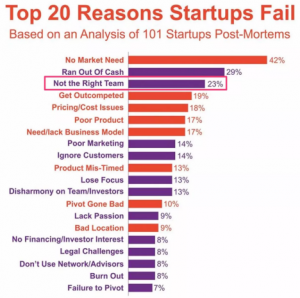Management skills hold the power to decide whether a startup will succeed or fail.
Starting a startup is itself a big risk in the first place and with it, you may face a few more certain risks if there is no proper planning for the risk management process before starting the startup. Some of the major risks are:
- Product risk
- Market risk
- Financial risk
- Team risk
- Execution risk
The execution and the team risk comes under management risk and this is the topic of discussion for us today in this blog.
In 2019 a statistics showed that 82% of startups failed because of bad management and lack of skills such as leadership and no proper communication due to not much-experienced management team.
A startup mostly starts with a handful of people in a business and during this time it is manageable to make sales, marketing and provide service to customers under a limited arena. Once a startup picks up the speed to grow and to be scalable, even the most talented people at times fail to take the startup forward. Hence, this builds up unnecessary stress and chaos within the team. Without well-developed management skills or a proper startup risk management process, daily pressures can soon lead to bad choices, shaky systems, and reactive decisions.
Let us explore how not-so-powerful risk assessment can impact a startup’s overall performance. Management in a startup plays a big role as it is one of the deciding factors whether the startup will be a success or a failure. Let’s take a startup with an excellent business plan, which begins its journey in the world with the hope to venture. It tries to have all the possibilities with amazing skill sets to be a successful startup. What are we all going to think about it? Definitely, we will think it is going to be a successful startup one day! But does a team of intellectual people guarantee a startup’s success in this competitive world?
The answer to it is a ‘NO!’
Even after having top people working together with great experience and knowledge, it gives us no guarantee that the startup will be successful. If there is a lack of coordination in management, the startup will fail miserably.

Let’s put some light on what management skills are?
Management skills are those skills that help a startup or a company to work efficiently with all the departments. These departments are working simultaneously with a set of rules/deadlines/budgets. A management team has to coordinate resources and training to maintain the quality of work within the set deadlines and budget. They may need to terminate some of them, minimize risk while considering the risk analytics and exposure for their organizations, and do it all in a timely and cost-effective manner to satisfy the customers. In other words, management is not everyone’s cup of tea. This role demands people skills, problem-solving, decision-making, and leadership skills altogether.
Now we will discuss some of the skills or training for startups which if lacked by management can affect the startup immensely.
- Lack of Teamwork is the major reason for the failure in the management:
Teamwork & team management comes from unity in an organization where every employee has a different thought process – but all of them at every step have to agree with a single idea or process and work solely to make it a success. If the opposite of it is happening, it is next to impossible to work with a team that is highly experienced.
Here is where the management team comes into the picture- they understand everyone’s point of view and work in a way so that no one feels left out and there is a middle path, agreed by all.
One of the key qualities of the team is Versatility, the more versatile the team is, there exist more chances for it to succeed
“Versatility” is not viewed as possessing more than one skill or talent but it involves the mindset of the people working together. Startup teams must possess the potential to change products, bring change in compensation plans, build up new marketing approaches, shift industries, rebrand the business, or even knock
down a business and start all over again. In other words, it is about recovering from the situation of hitting the rock bottom.
Teams that can recover together, also possess a quality of working harmoniously together especially in tough times.

97% of employees and executives believe a lack of teamwork can impact the output of a task or a project
-Source Mckinsey
37% of workers regard employee teamwork as very important.
Being part of an amazing team is highly preferred by employees. The study suggested that 27% of employees leave an organization because they do not feel any connection to it. In many organizations, teamwork and communication are considered very underrated in the workplace.
Recent team collaboration stats reveal that high loyalty levels of 33% were seen in the employees as a result of collaboration.
– Source (Bit)
- Hiring not the right person to the team

We didn’t realize that hiring the wrong person can do huge damage to the company as it wastes time and money and even if they learn about the working of the department and they aren’t able to adjust with the team in many cases, bad hires do not get along with other employees, which can cause additional problems for the cohesiveness of your team.
If a wrong person comes in a team it will compromise the employee morales
As the management is spending time and money trying to correct your mistake of a bad hire, the rest of your team may become dissatisfied or disengaged. It’s difficult to work with alignment when one team member requires more attention or in the worst case manages to bring the whole team down.
According to a survey, 95 percent of financial executives surveyed by Robert Half International said that making a bad hire at least somewhat affects the morale of the team, and 35 percent said a wrong hired person can greatly influence employee morale.
1/3 of HR specialists agree that engagement within the team markedly impacts employee morale.
Putting skilled employees in the same team doesn’t necessarily mean outstanding performance. If team members do not collaborate properly it has a probability that it can not be effective. 33% of HR professionals report poor team engagement decreases employee morale. Workplace engagement statistics spot micromanagement as the second most common factor for low morale in the organization.
Some examples reflecting the failure of startups due to bad management and wrong hiring such as
A diverse team with different skill sets was often cited as being critical to the success of a company. Failure post-mortems often lamented that “I wish we had a CTO from the start” or wished that the startup had “a founder that loved the business aspect of things.”
At Fieldbook, which shut down after failing to build a sustainable business model for its database product, co-founder Jason Crawford wrote in his post-mortem blog post that the company’s inability to make key hires was one of the reasons for its downfall:
“I was blindsided by the difficulty of hiring. Hiring was something I’d done successfully for years, including in the early days of Fieldbook and in a previous startup. But at a time when every engineer wanted to work on AI, self-driving cars or cryptocurrencies, a SaaS startup with modest, sporadic growth wasn’t very attractive. I knew that investors would need to see strong, consistent growth before our Series A, but I didn’t expect that engineers would need to see it to even join before Series A.”
Lack of experience, combined with mismanagement, was one of the factors behind the downfall of Katerra, the high-flying construction startup which raised nearly $1.5B in funding. As The Information summarizes,
“The SoftBank-backed startup said it could slash the cost of building and renovating apartments, luring big-name investors. But the company, run by a tech veteran with no previous construction experience, ignored escalating problems and at one point
The other two skills lacked by management will be discussed in part-2.
Stay tuned for part-2.
Submitted by: Kanchan Rathore, Member of Student Risk Club (SRC)














